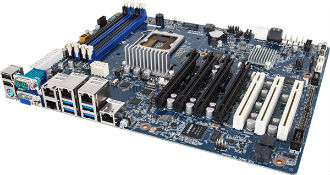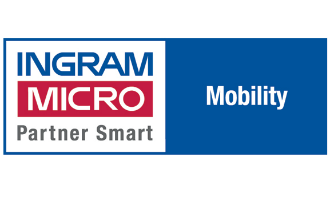 Sapphire has appointed Micro-P as its latest tier on UK distributor. Micro-P is a leading B2B distributor and Sapphire hopes it will help it broaden channel reach in Britain, create more market demand and generate more revenue, naturally.
Sapphire has appointed Micro-P as its latest tier on UK distributor. Micro-P is a leading B2B distributor and Sapphire hopes it will help it broaden channel reach in Britain, create more market demand and generate more revenue, naturally.
Large system integrators run UK IT oligopoly
 Infrastructure outfit Databarracks claims that there is a large systems integrator oligopoly which needs to be exposed by an Office of Fair Trading’s (OFT) government IT procurement investigation.
Infrastructure outfit Databarracks claims that there is a large systems integrator oligopoly which needs to be exposed by an Office of Fair Trading’s (OFT) government IT procurement investigation.
The investigation into the antics of the big government systems integrators has been announced by the OFT and welcomed by Peter Groucutt, Managing Director at Databarracks.
Groucutt, MD at Databarracks, has urged all sides to ensure that this is the end of the domination of large system integrators.
He said that the top 20 IT suppliers to Government earn £10.4 billion a year in revenue and are continuing to dominate the market.
“Given this apparent oligopoly and the propensity for large long-term contracts, the OFT is keen to ensure that the competition is healthy to allow for costs cutting, improved efficiency and increased innovation,” Groucutt said.
The OFT wants suppliers and purchasers to get in touch to discuss their experiences and Groucutt believes all parties should wade in.
He said that those involved in the procurement process need to participate and be honest in this process if there is going to be an end to the domination of a few big players in the market.
Groucutt said it’s important to ensure the taxpayer is getting the best deal, that government departments are receiving the best value and most innovative kit.
“The only way I can see this happening is ending the current oligopoly,” he said.
The current cumbersome tender process pushes government departments into the arms of the larger SIs as it is so difficult for smaller players to get accreditation or have the opportunity to sell to the public sector.
Prism threatens US cloud leadership
 US IT cloud companies could be shut out of the EU thanks to its government’s obsession with spying.
US IT cloud companies could be shut out of the EU thanks to its government’s obsession with spying.
While the EU is happy to have its own governments spying on citizens, it is less pleased when the data goes over the pond. Last year it warned that US cloud providers should make sure that data stays within the EU.
Now it seems that PRISM has indicated that the US companies will hand over European corporate data even if that information has not crossed the US border.
Neelie Kroes, European commissioner for digital matters, warned that if she was an American cloud provider, she would be quite frustrated with her government.
In her view, European businesses are likely to abandon the services of American internet providers because of the National Security Agency surveillance scandal.
Her statement appears to be more of a prediction than signs of a potential ruling from Brussels.
In a statement, she said that if businesses or governments think they might be spied on, they will have less reason to trust cloud, and it will be cloud providers who ultimately miss out. “Why would you pay someone else to hold your commercial or other secrets if you suspect or know they are being shared against your wishes?” she said.
Kroes said that American providers will miss out because they are often the leaders in cloud services. But if European cloud customers cannot trust the United States government, then maybe they won’t trust US cloud providers either.
“Concerns about cloud security can easily push European policy-makers into putting security guarantees ahead of open markets, with consequences for American companies. Cloud has a lot of potential. But potential doesn’t count for much in an atmosphere of distrust,” Kroes said.
OECD: BYOD is ugly
 Changes in phone acquisition models might be about to contribute to the slowdown of smartphone sales in some markets, as well as BYOD adoption rates. An OECD report found that most markets are still heavily relying on subsidised phones and bundles, available on two-year plans.
Changes in phone acquisition models might be about to contribute to the slowdown of smartphone sales in some markets, as well as BYOD adoption rates. An OECD report found that most markets are still heavily relying on subsidised phones and bundles, available on two-year plans.
However, in many countries most mobile plans include an entitlement to a handset discount, which makes BYOD unattractive with costlier mobile plans. In spite of that the report found that in some big markets, such as France and the US, bundled phones actually end up $10 to $20 more expensive than the BYOD option. What’s more, the differences aren’t even evident to most consumers, which isn’t the case in some countries which mandate operators to disaggregate the cost of the device in monthly bills, revealing the actual cost of bundled phones.
The report found that operators in the UK are still trying to push two-year contracts, as they help create a stable customer base. One month contracts are used by about 17 percent of British consumers and the number has been more or less stable since 2007. However, two-year contracts accounted for 68 percent of sales in the first quarter of 2011, up from just 2 percent in Q1 2008. At the same time the number of 12-month or 18-month contracts is decreasing.
It is evident that the vast majority of high-end smartphone sales are coming from two-year plans and that this won’t change anytime soon. However, it is an inherently risky approach. Although two-year contracts with fancy bundles can help maintain a stable customer base, smartphones aren’t evolving nearly as fast as they did two or three years ago. The upgrade cycle is slowing down and the model might not work a few years from now, since Vodafone, O2 and EE aren’t offering subsidies anymore.
Consumers aren’t about to ditch bundled phones in favour of unlocked devices and cheaper plans, but the protracted economic downturn might prompt them to do so in the future.
However, having a good customer base and heaps of new devices sold every year allows carriers to invest more in infrastructure. Smartphones are driving 3G and 4G growth and without two-year bundle deals development would be much slower.
The OECD report concluded that consumers can benefit from reduced lock-in by simply buying a pricey smartphone through monthly instalments and using a cheaper plan. Increased transparency, such as disaggregating the cost of the phone in the monthly bill would help as well, along with more unlocked phones. It all comes down to the consumers, but most of them don’t appear to be well informed and savvy to compare competing mobile plans, or the cost of getting an unlocked phone and a separate plan.
Gigabyte confirms record mobo sales
 Although the PC industry is going through a rough patch, some outfits are still doing quite well and one of them appears to be Gigabyte.
Although the PC industry is going through a rough patch, some outfits are still doing quite well and one of them appears to be Gigabyte.
On Friday the company announced that it is on target to sell 20 million motherboards this year, its best result ever. Gigabyte apparently shipped 4.8 million motherboards in Q1 and by the end of the second quarter its shipments hit 9.9 million units.
“Obviously this is excellent news, proving not only that we’re doing a decent job of fighting our corner in a highly competitive market segment, but that the PC market as a whole is humming along nicely,” said Gigabyte.
Although it is nice to hear some optimism in an otherwise desperate market, we’re not sure the PC market “as a whole” is humming along nicely. However, Gigabyte’s motherboard business certainly is. Last year the outfit managed to gain quite a bit of ground and now it’s breathing down Asus’ neck. Asus and Gigabyte currently control about half of the worldwide motherboard market and, if it keeps growing, Gigabyte might overtake Asus pretty soon.
Smaller players like ASrock and MSI are far behind, with annual shipments under 10 million units, while ECS, Biostar, Foxconn and others are fighting over scraps.
Dell wants to get into wearable computing
 Troubled PC seller Dell is planning to pin its hopes on a much mooted craze in wearable computing.
Troubled PC seller Dell is planning to pin its hopes on a much mooted craze in wearable computing.
Already it has seen its rivals such as Google, Apple and Samsung talk about wearable computing being the next big thing and is hoping to have a stab at it early..
Sam Burd, Dell’s global vice-president of personal computing, told the Guardian that Dell was “exploring ideas in that space”.
He said that there were challenges in cost, and how to make it a really good experience. But it was expected that computers were getting smaller and having a watch on your wrist was “pretty interesting, pretty appealing.”
CEO Michael Dell is preparing to take the company private in a $24 billion leveraged buyout as the PC market, which made him a household name, begins to shrink in importance. However it appears that the company is also seeking new sources of income.
Burd said that over the next five years devices and form factors to continue to change. There will still be a need for ‘static’ computing on desktops, but there will be a real need for mobile devices.
“There’s a lot of discussion about how that fits into wearable devices like we’ve seen with Google Glass and watches. We’re looking at a world of lots of connected devices,” he said.
Burd did not see any magic new form factor arriving like the tablet did. But the number of computing devices per person is exploding.
Dell has not announced any actual products in the wearable market but was looking at the technology, Burd said.
Ctrack pushes European markets
![]() Online vehicle tracking outfit Ctrack is expanding its European operations and appointed a new manager to drive the push.
Online vehicle tracking outfit Ctrack is expanding its European operations and appointed a new manager to drive the push.
Richard Lane has been named as the company’s new European distribution & partnerships manager.
Ctrack currently has distribution operations in Denmark, Norway, Sweden, Finland, Czech Republic, Switzerland, Austria, Italy, Spain and Portugal to complement its owned operations in Germany, France and Benelux.
The new management role requires Lane to find suitable partners in countries where Ctrack currently does not have a presence.
In a statement, the company said it is is keen to take advantage of untapped vertical markets such as insurance telematics.
Lane was previously responsible for channel sales within the UK & Ireland. He joined Ctrack having spent four years at Cybit, and subsequently Masternaut, responsible for developing and managing its reseller programme.
John Wisdom, European managing director of Ctrack, commented said that Lane had been responsible for extending the reach of the business within the UK by establishing an effective partner and reseller network.
“We are looking to use his proven expertise to take advantage of opportunities that exist in new European markets to maximise the growth of the business across the region,” he said.
OFT launches public IT investigation
 The Office of Fair Trading has just launched an investigation to scrutinise government IT procurement and the companies that supply it.
The Office of Fair Trading has just launched an investigation to scrutinise government IT procurement and the companies that supply it.
The top IT software and service providers earn roughly £10.4 billion a year through public sector contracting. That said, public IT projects are known for their disastrous implementation and frequent high profile bungles. Top providers often lock the public sector into excessively long contracts which must be seen to the end, and in some cases drag on even longer.
This is not a phenomenon specific to the UK. The public sector often finds itself duped into taking on bloated contracts that arguably provide little value for money, and serve more as a cash-cow for funnelling public money into private pockets without noticeable gains or efficiencies to the public.
The OFT announced that it wants to ensure market competition is up to scratch so that all firms can, at least, bid for projects without contracts automatically going to the biggest players.
“Healthy competition in any market drives down costs, drives up efficiency and promotes innovation,” an OFT statement read. “While a lack of competition can hinder productivity and, in turn, economic growth”.
G-cloud, a government project to open up procurement away from the the IT giants and offer SMEs a fighting chance, has been fairly successful but elsewhere the big hitters still dominate.
Phil Dawson, CEO of Skyscape Cloud Services, offered his comments on the investigation. “For far too long, IT giants and incumbent suppliers have been allowed to reign supreme,” Dawson said. “It is precisely this dominance that has created a stagnant public sector market, which is exactly what the G-cloud programme was established to tackle”.
“Through G-Cloud, public sector organisations are able to avoid inflexible contracts and the locked-in clauses which have been all too common with some of the big incumbent providers,” Dawson said.
The OFT will be examining whether there are barriers stopping smaller businesses from competing, as well as the difficulties associated in the public sector for switching suppliers.
This review aims to look specifically at if market supply is hampering competition rather than a general overview of public IT.
An approach oriented along the lines of G-Cloud would certainly be welcomed by British SMEs, as these companies can offer services that do not lean as heavily on the public purse.
To push further still, perhaps it is worth exploring open source products and services as other flexible, and potentially far cheaper, options.
A reorientation in public IT towards smaller firms, however, could easily upset top corporate lobbyists of the biggest businesses. A push towards open source alternatives would agitate even more.
Red Hat EMEA channel conf details announced
 Open source profiteer Red Hat has announced dates for the fifth Red Hat Europe EMEA Partner Conference in Madrid this year.
Open source profiteer Red Hat has announced dates for the fifth Red Hat Europe EMEA Partner Conference in Madrid this year.
The event will run from 29 September to 2 October 2013 and will open with keynotes from top executive veep in sales and services, Arun Oberoi, and CTO Brian Stevens. Veep of partners for Red Hat EMEA, Petra Heinrich, will also be speaking about general partner strategy.
There will be a series of panel discussions on current and future trends in open hybrid cloud, middleware, platform offerings and product strategies. As is expected from this sort of thing, there will also be breakout sessions and talks on best practices about enterprise IT, specifically focusing on using open source tech and making the shift from physical to virtual and cloud platforms.
Red Hat is calling on distributors, ISVs, OEMs, system integrators and other partners, potential or existing, to discuss with each other and gain access to Red Hat’s top execs. Platinum and gold plus sponsors, IBM and HP respectively, will also be attending.
The company asserts, in a tone which would not sound out of place read by Genesis P Orridge over an abrasive and menacing tape loop: “The Red Hat EMEA Partner Conference will be comprised of three pillars. Pillar one is built on datacentre integration with the key themes of partner enablement and IT modernization. Pillar two is built around middleware and the requirement to migrate legacy applications in an open environment. The third pillar focuses on solving the new workload challenges inherent in open hybrid cloud and big data environments.”
HP Software UK in channel push
 HP’s channel director for UK & Ireland has said the channel is crucial to expanding business in the territory – while also handing ten percent of direct sales over to resellers.
HP’s channel director for UK & Ireland has said the channel is crucial to expanding business in the territory – while also handing ten percent of direct sales over to resellers.
HP Software has lofty plans to double its size and this will mean a slight strategic shift in how the division operates.
Speaking at an HP event, CRN reports Toffis acknowledged the channel business share is leaning on direct sales.
Toffis pointed out that partners are key to the company’s aggressive growth strategy, not just in the UK, but worldwide. “We know we can’t do that without partners,” Toffis said. “We need partners to help support us in the growth and we’re investing to be able to do that”.
Recently, HP tinkered with its Partner One T&Cs, slashing the amount of certifications required by half, in a bid to bring in more channel partners.
At the moment, HP’s UK, France and German operations mostly run through direct sales, but here in Britain over half of all sales do involve a partner on some level.
Last year, HP announced its intentions to introduce a One HP strategy across the board – that is, to unify the operations of its many, many divisions and simplify the way each of these engages with partners. HP execs, speaking with ChannelEye, have individually confirmed this is on track, and so we could expect to see similar movements across other UK&I market segments.
Carphone Warehouse to become tablet warehouse
 Carphone Warehouse is planning to expand its tablet offering this year, following strong demand in 2012. The company saw plenty of growth in tablets in the latter half of the year, hence it is planning to invest more and grow market share in tablets.
Carphone Warehouse is planning to expand its tablet offering this year, following strong demand in 2012. The company saw plenty of growth in tablets in the latter half of the year, hence it is planning to invest more and grow market share in tablets.
Carphone Warehouse said it will continue to develop the tablet category, both through standalone sales and handset/tablet bundles.
“The development of 4G services is expected to improve download speeds significantly and therefore to stimulate demand for tablets with connectivity to mobile networks as well as wi-fi services,” the company said. “We achieved increased relevance in the tablet market, in part through bundling with mobile phone connections. During the year, we have increased our market share across all our categories and further built our trusted brand. “
As one of the leading retailers in the ever growing mobile sector, Carphone Warehouse had a rather good year. In its annual financial report, the company revealed an 11.5 percent spike in generated revenues, although earnings rose just slightly.
Earlier this week the company also announced that it has enlisted Kate Moss to design a range of smartphone and tablet covers, as part of its new “fashion tech” line of accessories. Not exactly relevant, but it gives us a good excuse to use a gorgeous thumbnail.
Ingram Micro Mobility could go MVNO
 Ingram Micro Mobility is looking into the possibility of launching its own MVNO, which could help it fuel further mobile growth in the UK. Ingram Micro’s UK and Ireland VP James Bannister told Mobile News that the company is actively looking for new ways to boost mobile revenue.
Ingram Micro Mobility is looking into the possibility of launching its own MVNO, which could help it fuel further mobile growth in the UK. Ingram Micro’s UK and Ireland VP James Bannister told Mobile News that the company is actively looking for new ways to boost mobile revenue.
Bannister said the company would not try to become an established airtime distributor, but it would explore other airtime options, such as SIM packing and shipping phones with SIMs.
“We may launch an MVNO, but we will do it differently to our competitors, so watch this space is my message,” he said.
Bannister said he doesn’t see the assisted sales model as a big opportunity, as it assumes people can’t get access to the product, but that approach doesn’t work since most IT customers already have someone to take care of that.
He added that Ingram’s acquisition of BrightPoint was very positive for the company, as it brings a strong balance sheet and a long-term commitment to make the UK business into “something sexy”.
Microsoft and Solidsoft go for medical system
 Microsoft’s Windows Azure cloud platform has been selected to power the new European Medicines Verification System (EMVS).
Microsoft’s Windows Azure cloud platform has been selected to power the new European Medicines Verification System (EMVS).
The system will be developed by Solidsoft, a Microsoft Gold Partner. The system was conceived by European Stakeholders Model (ESM) Partners, which represents the majority of the European pharmaceutical industry.
The system will handle information on more than 10 billion medicines dispensed throughout all 28 European Union member states. All meds will feature a unique, encrypted product identifier which will be scanned at the point of dispensation and then verified for authenticity in the Azure cloud.
“We look forward to the start of the implementation of the European Medicines Verification System. Patients need to be able to trust in the medicines they take and this is a timely and important step towards finding a solution to the urgent problem of counterfeiting in the EU,” said Richard Bergstrom, Director General of ESM partner, The European Federation of Pharmaceutical Industries and Associations (EFPIA).
Solidsoft CEO Garth Pickup said the cloud has changed the dynamics of large IT projects forever.
“The almost limitless scale provided via the Microsoft Windows Azure platform means that this massive project can be delivered to the EFPIA at much lower cost than on-premises. It will also easily scale to the 10 billion+ transactions it will handle each year in real time,” he said.
Mark Smith, Director for Health & Life Sciences at Microsoft UK, said the Windows Azure platform innovative companies to take on large projects, leveraging the vast computing resources of Microsoft’s data centres.
May console sales worst in 13 years
 May seems to have been the worst month for console sales in 13 years, before the introduction of the PlayStation 2.
May seems to have been the worst month for console sales in 13 years, before the introduction of the PlayStation 2.
According to Wedbush Securities, sales of console games were just $175 million in the US, down 31 percent from $255 million last year. Wedbush was expecting a drop of 16 percent and sales around $216 million.
Unit sales of console software were down 26 percent, while ASPs were down 8 percent. This is hardly surprising, as new consoles are rolling out and few consumers are willing to buy software for old systems. However, PC game sales were even worse.
Sales of PC gaming software were down 84 percent year-on-year. Hardware sales were down 31 percent and the US spent only $96 million on PC games in May.
Wedbush Securities analyst Michael Pachter believes sales should pick up in June, as several new AAA titles make their presence felt, but no big improvement is expected until next generation consoles start shipping in volume, reports wallstcheatsheat.com. Positive growth should return in September, as a number of new game releases are timed to coincide with the availability of the PlayStation 4 and Xbox One.
New consoles are expected to have a massive impact on sales toward the end of the year and 2014 should be good as well. However, handheld consoles will face even more competition from mobiles and tablets.
IBM to invest $1bn in flash R&D
 IBM has announced it will invest $1 billion into flash R&D as well as launching a series of SSD based systems.
IBM has announced it will invest $1 billion into flash R&D as well as launching a series of SSD based systems.
Flash will be integrated into all IBM server and storage systems as well as a new flash only storage system.
Not only is flash a “key tipping point”, according to head of IBM software and systems, but eventually data centres will be completely comprised of solid state drives, reports Solid State Technology.
IBM has also announced plans to open 12 centres worldwide which will allow its customers to test flash products in various scenarios. They will be able to test flash performance in various scenarios that require heavy workloads like in stock exchange transactions and credit card processing.
Data Memory Systems has taken the announcements to mean all enterprise Tier 1 storage should be totally flash based, reasoning that the shift toward cloud and big data makes processing data quickly a necessity. Because traditional HDDs have not increased phenomenally in speed over the last years, flash can potentially increase processing speeds by 90 percent for certain tasks, for example in banking and trading where speed is critical.
It is not the end of traditional hard disks yet, as they still offer cost benefits now, but IBM’s decision to invest so much in flash storage shows the direction the industry is headed.





